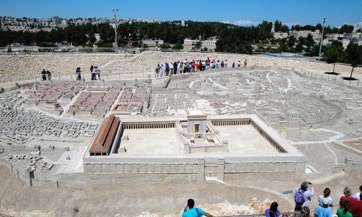
Scale Model of (Herodian) Temple Mount
Jerusalem, Israel; Photo: Thomas Edward Cook
Disclaimer: As with all our resources and especially Podcasts, inclusion does not necessarily mean endorsement of the views presented. Our aim was to include important presentations from multiple points of view so the researcher can form her own opinions—informed by a Christian world-view.
Resources:
- Canonicity Issues
- Textual Criticism Issues
- Higher Criticism Issues
- Biblical Languages Issues
- Hermeneutical Issues
- Video: Murray on Theological Acuity
Dr. Craig Blomberg’s Biblical Bibliography (Denver Seminary)
Introduction:
Why talk about theological acuity on Level 1 of an apologetic site? The answer to that seem multiple and fairly obvious, but for the sake of clarity let me explain what I mean by theological acuity and why it’s an important consideration when doing apologetics in academe. And why we have to give this consideration pretty quickly.
“Theological acuity” as I am using the term, first, has to do seeking theological truth. As a theoretical matter such a quest would aim at things (for starters) like clear thinking, an examination of the methods which purport to deliver theological truth, and an examination of the justification for the results produced by those methods. All that sounds good and fine to the majority of those who engage in these sort of endeavors--who advocates sloppy thinking or the abandonment of critical thinking? Don’t we all want to arrive at results that are trustworthy and reliable?
However, after that everything seems to be a buzzy controversy even among folks of my own intellectual persuasion. That may overstate things a bit, but there does seem to be a fair amount of disparity of opinion on critical issues even among those who share very similar intellectual and theological traditions! Do I need to document that, too?!
Despite that alleged state of affairs, I do want to go on to assert that to have an effective apologetic ministry (give a reason for our hope in Christ) in academe requires more than a Sunday school knowledge of the Bible and a casual attention to the features of critical thinking. That is, despite the lack of consensus from well-informed people on this subject, we are not given a pass to eliminate our own perspective and contribution to the rational defense of the great things of the gospel.
And you would do well to think through your view of the relationship between the historical reliability of the Bible (generally) and the historical reliability of the claims in the gospel. And in doing so we are pretty quickly get immersed in issues like textual criticism and higher criticism, cannonicity issues and hermeneutical (interpretation of texts) problems.
All this required work can present a tension for a Christian who acknowledges that, “knowledge puffs up, but love edifies” but also feels required to give a reason (rationale or rational defense) for the hope that is within us, yet with gentleness and reverence. These two virtues do not necessarily have to come into conflict and those who would argue against that, themselves must produce a GOOD theological defense for that position, which would necessitate those virtues!
All that to say, as Christians we can and should avoid the pride that comes from learning and maybe especially avoid the pride which could emanate from practicing our gifts at the so-called bar of “higher” learning; but at the same time don’t we feel compelled to learn to love the Lord with all our hearts, soul, MIND and strength (emphasis mine)? That challenge becomes front and center in a ministry to the secularized world of contemporary academe. How interesting and wonderful!